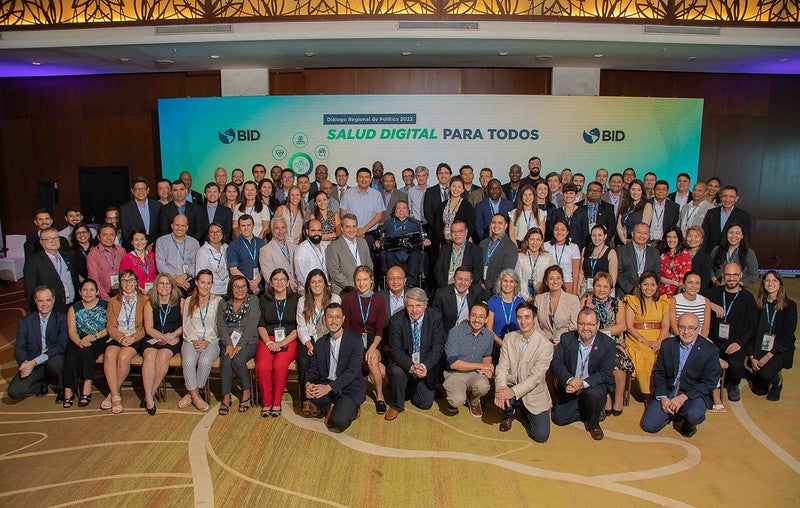How can we ensure that digital health improves health outcomes in an inclusive way in Latin America and the Caribbean? This was one of the main points of discussion among country leaders in our Social Protection and Health Division’s Regional Policy Dialogue, Digital Health for All: LAC’s Golden Opportunity to improve the efficiency, quality and equity of sector. The RPD constitutes one of the IDB’s main mechanisms to promote knowledge sharing between high-level government officials from Latin America and the Caribbean and experts in key development areas.
The event took place from September 12-14 in Panama City, Panama and brought together over 120 participants, including leaders from over 20 countries, Vice Ministers of Health and directors of technology and communication, with regional and global experts in digital health, including PAHO, WHO, the ONC/GDHP and Dr. Bertalan Meskó, the Medical Futurist!
The meeting sought to provide a space to discuss what IDB and countries have learned in the past four years of implementation of digital health, structural challenges to scale digital health, and what measures we need to take to ensure that decisions made today are both sustainable and transformational. The meeting’s objectives included discussing: 1) how to ensure digital health adds value in terms of improved efficiency, quality and equity; 2) policy considerations for linking digital health to health outcomes; and 3) the future state of our region in terms of digital transformation of the health sector.
The first day of the meeting focused on the importance of transforming the health sector and the golden opportunity digital health offers for the region. Participants discussed the types of changes the pandemic had catalyzed for the sector in addition to taking stock of the progress made in the region since the 2018 SPH regional policy dialogue on the topic.
The second day of the meeting focused on how policymakers can ensure that digital health is truly transformational, by taking intentional steps to ensure it is inclusive and improves quality and efficiency at the health systems level. The second day also explored how evidence-based digital health interventions can combat depression, hypertension, and diabetes and how LAC countries are putting some of these interventions in place.
The third day of the dialogue explored the possibilities of cross-border digital health and countries co-created a future state vision for the region. Throughout the event, a demonstration booth exploring cross-border digital health and interoperability was available where participants could explore the LACPASS initiative, Digital Documentation for COVID-19 Credentials (DDCC), digital wallets and credentials. Participants were invited to join regional workspaces to continue the conversations started in the dialogue. All presentations, graphical note-taking, photos and videos from the event can be found on the SPH Regional Policy Dialogue Website and detailed in the event report.
Besides the amazing opportunity to see colleagues and partners in person, the dialogue among the participants left me with three main issues that require immediate attention:
1. Sustainability & Momentum
All countries had made extremely important advances in terms of digital health since 2018, but all were concerned about how to ensure that we wouldn’t lose the momentum of COVID-19 and instead ensure that the progress made was sustainable and scalable. Issues such as securing budget to maintain and evolve existing digital services and applications for COVID-19 to other health areas. Telehealth was front of mind, especially as for many countries, current norms only allow for its use during the COVID-19 public health emergency. Ensuring that foundational investments continue, in addition to updating policies in this critical moment post pandemic will determine the extent in which digital services for health will be incorporated into health systems.
2. Digital inclusion in Policy & Practice
Equity and inclusion were discussed every day of the dialogue. It was clear that participants noted that digital tools can help LAC to become more equitable and inclusive, however, without intentional efforts, there is a huge risk they will widen the health inequity gap. How to define inclusion – in terms of digital literacy, gender, ethnicity, age, physical disability, connectivity and digital equipment, geography, and access to services – and how to incorporate both practical actions and policy recommendations and how to measure progress is critical to focus on in the short term.
3. Cross-border digital health – the next frontier is here
Countries had clear visions regarding the potential of cross-border digital health for the region. From optimizing human resources to ensuring patient safety to being better prepared for the next pandemic, creating regional agreements on standards and governance and infrastructure is critical for a region as interconnected as LAC.
Thank you to the country leaders that made this dialogue on digital health so enriching and the IDB team that made the event possible! Looking forward to our next dialogue on the topic to measure how far we’ve come!


Given the role of faith-based health systems in addressing health challenges in the LAC, how can they become participants in these dialogues and benefit from investments in technology. to save lives and lower costs?